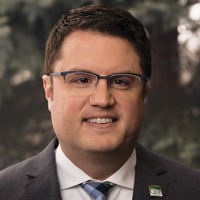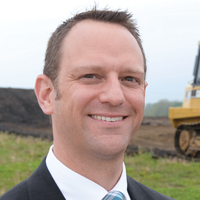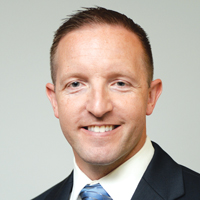Cities’ Young CEOs
It isn’t the most glamorous job, but young local CITY LEADERS are called to it

KENT DARR May 22, 2018 | 9:02 pm
19 min read time
4,616 wordsAll Latest News, Business Record Insider, Government Policy and LawAt 33, Jake Anderson is fairly certain he can predict his career path. And why not? “We often joke that it’s a sickness,” he said. And a dedication to public administration is incurable.
Anderson starts work May 29 as Grimes city administrator. He is an old hand by now in this role of playing chief executive for municipal government. In 2010, a short time out of graduate school at Drake University, he started work as the city administrator for Van Meter.
The “we” he referred to is the group of people who serve as city managers and city administrators — yes, there is a slight difference between the two titles — and find their days and nights occupied with all things local government.
“It doesn’t matter what you are doing, when people run into you they want to talk to you about city business. It’s something where you have to be on all the time,” he said. “For me, it doesn’t matter if I’m going to sleep at night or making a cup of coffee in the morning, my mind is engaged in my work and I’m thinking about the city’s business.”
Anderson is among the youngest of a relatively young crop of administrators in Greater Des Moines. Matt McQuillen, who transitioned from assistant city manager to city manager for the city of Clive in January, is 36. While that might seem a fresh age to carry the weight of a city, Anderson and McQuillen have a range of experience. They were in their 20s when they started their careers and today they are at the same age as many of the older hands were when they started their careers years ago.
Still, you have to wonder what the attraction is for a young person to a career that offers little glamor, lots of focus on things like water and sewer systems, and the promise of long days and nights. And once you have the job, why stick with it?
“It is more than a job or a career,” Anderson said. “City management is a lifestyle.”
It can be a bumpy lifestyle. Whether negotiating between the owner of a tavern that plays music considered too loud by residents or calling a parlay with business owners, city council members and a chamber of commerce over something that might seem as trifling as sandwich boards on a sidewalk, everybody wants your ear.
When Indianola City Manager Ryan Waller started his work in January 2016 — he was 37 at the time — he launched something of a service with a smile campaign among department heads and city workers. There may be no connection between that ongoing effort and a dustup that went public last year after a department head claimed he was forced to retire because of his age. Still, Waller found himself the center of attention during last year’s city elections, with some observers speculating that his job was on the line. One council member was quoted in the Des Moines Register as saying Waller was the victim of a “witch hunt.”
Waller said that through it all he had strong support, not the least of which came from his wife. Is the job a lifestyle? Waller’s experience might answer the question. By the way, he remains Indianola city manager, has been appointed to the board of the Greater Des Moines Partnership and recently has taken a new tack on the service with a smile attitude in which city workers answer the question “Why do I serve?” with “Why ask?”
“We are not an employment agency,” he said. “We are a service organization. We are not a company that sells a product, then we’re here and we’re gone. We as an organization don’t go away.”
Because they recently moved into new jobs, the Business Record asked Anderson and McQuillen to answer a few questions. We also asked city executives who have less than three years in their position to answer a few questions. You can find responses from Waller and Norwalk City Manager Luke Nelson on Page 11.
‘Addicted to it’
Jake Anderson, city manager, Grimes
There’s isn’t much glamor with this job. Why do you do it?
I was telling our search committee for the Van Meter job [he is helping the city recruit his replacement] that there is something about it, you get addicted to it. Some of us have joked that it is a sickness, though that probably is not the ideal way to explain it. It consumes everything. It is more than a job or a career. City management is a lifestyle. Your day does not end at 5 o’clock. You have evening meetings, and even when you are not in a professional setting, it doesn’t matter what you are doing, when people run into you they want to talk to you about city business. It’s something where you have to be on all the time. For me it doesn’t matter if I’m going to sleep at night or making a cup of coffee in the morning, my mind is engaged in my work and I’m thinking about the city’s business. It does require a certain personality type.
What will you miss the most about Van Meter?
I’ll miss the team of employees. I’ve built a pretty tightknit and cohesive team. Not that there won’t be a good team in Grimes as well. But as you develop a relationship with your team, you really start to think of your co-workers as your close friends, almost akin to family.
What have you accomplished during your time in Van Meter?
We’ve done a number of things. We did the certified site. During the last year, we have been watching our inventory of buildable lots diminish. The City Council adopted a tax abatement program. We have a number of development concepts that are in the works and I think are close to submitting preliminary plats. Gearing Van Meter toward growth and development I would mark down as significant developments.
Is Van Meter a sleeper for future growth?
Van Meter has done a lot to position itself for growth, but Van Meter has some challenges that can be expansive. What makes Van Meter beautiful for a residential setting is the Raccoon River valley, but that landscape can make it difficult to run sanitary sewer and to build stable foundations. There is a lot that can be done from a public policy perspective to get things to where they need to be for the growth that is coming Van Meter’s way.
What is the status of efforts to improve water service in Van Meter?
Van Meter just has hard water. It has been a common complaint in the community for 30 years. In the early years when I was here, we got together with the city of De Soto and we studied drinking water treatment alternatives and thought maybe there would be an opportunity to work with our neighbor on that or maybe we would buy from Des Moines or maybe we would build our own plant. That study concluded that maybe the city should build its own, but what it identified for us was that we had a long ways to go with water rates. We put a plan together and started studying water rates in pretty dramatic fashion, actually, which not everyone has really appreciated. But the city now is in a position to build a water plant. And we have been engaged by West Des Moines and Waukee. It’ll be interesting to see how the regional delivery discussions go, because if that doesn’t happen on a regional basis, I think there’s a pretty good opportunity for some of the western communities to do something on their own. Grimes is in a similar boat. I know they have been investing in water production.
Anything left undone?
The water treatment plant is something that we spent a lot of time and focus on, and it would have been nice to have seen that finished. I am confident that the work we have done has brought the project to a point where something tangible will be completed in the near future. At least it’s not something that hasn’t been examined. There is a financial plan in place to do it now and there is a political willingness to do that as well, so it will happen, but it would have been good to see it through.
What is a unique problem that you had to deal with in Van Meter?
Van Meter, I think, struggles to compete with its neighbors to retain staff. If you live here, it is easy to commute. In the larger communities, certified police officers, certified water operators are pretty marketable employees and can make quite a bit more money. So how do you balance that? That is something that Van Meter will continue to wrestle with. I’m not sure we have it solved. We’ve tried to do a compensation study, but it will be something that Van Meter will need to pay close attention to.
At least part of Bill Knapp’s farm is in Van Meter. What is it like to have him as a resident?
Bill and Susan personally and Knapp Properties control a lot of the property around Van Meter. Bill and Susan are always pretty supportive of our town celebrations and community efforts. They played a significant role in the American Legion project, which is a beautiful facility. For a small town, with the Knapps and Gabuses, Van Meter has given me an opportunity to work with some pretty serious developers in Central Iowa. It has been an amazing experience for someone who has chosen a career in government. I can’t imagine a better training ground. All of that translates really well for me in Grimes; the Gabus family has the Heritage development and Knapp certainly has some commercial interest in Grimes. Another one who is neighbors with Bill and Susan is Dan Cornelisen [senior vice president at Hubbell Realty Co.], and Hubbell has projects in Grimes. There are just a lot of connections that I have been able to make here that will serve me well.
What attracted you to Grimes?
Career progression. I have family in Grimes. Dallas Center-Grimes is another school district like Van Meter that is well respected. Grimes is a little further along on the growth curve, and it will provide me with additional opportunities to participate in the growth and development of the community. That’s pretty exciting. Again, it comes back to continuing to build on those relationships that I have been able to establish.
The city’s current comp plan is calling for a population of 40,000 people by 2040, which is really not that far away for a town that is between 15,000 and 20,000 people now. That is a tremendous amount of growth. A lot of the dynamics are the same, balancing community character against growth, making sure in a financially responsible way we are maintaining and providing infrastructure for what exists and that we have sufficient capacity to handle the growth that is coming, that is planned. There are tremendous similarities between the two.
You will be working with similar challenges, just on a larger scale.
Water and sewer are an issue for Grimes. They are going to need to make large capital investments. There is a lot to sort through there. Whatever becomes of it … it’s just pretty exciting. They are anticipating somewhere in the range of $40 million that they need to spend on water and sewer. That’s pretty crazy.
You can’t escape water and sewer issues in this line of work.
What we found to be true is that the exciting stuff that does happen, the growth and the development, new retail services, things that people do get excited about, they happen when you have the trifecta of infrastructure in place, and that’s the water, the sewer and the street access. That stuff no one gets super excited about, but without that the more exciting stuff just doesn’t happen. That and where you place elementary schools drives residential development big-time.
Who inspired you to do this?
Both of my folks are in public service. My dad works for the secondary road department in Webster County and my mom works for the (Natural Resources Conservation Service) office in Fort Dodge, so public service is maybe just how I’m oriented. But I certainly have mentors that I look up to and that I continue to learn from. Those guys are pretty much in the neighboring communities in Grimes. I think pretty highly of Tim Moerman and AJ Johnson and Jim Sanders. I sure look forward to working with those guys more closely in Grimes and continuing to learn from them.
What other plans do you have for your career?
The folks in Grimes asked that. I can remember a time when I thought, you know, maybe someday it would be pretty cool to land in Grimes. That would be nice, but I’ll need to work in a slightly bigger town than Van Meter before I can get there. So I couldn’t be more pleased. It’s hard to forecast any farther ahead. Since college, it feels like my wife and I have moved a lot, and it would be nice to stay in Grimes a good long time. I think I could easily make Grimes home for the next 20 years if they’ll have me that long.
Making a difference
Matt McQuillen, city manager, Clive
Matt McQuillen is wrapping up his fifth month as city manager in Clive, but he is no stranger to city government. He has held a variety of positions in city government since graduating in 2006 from Iowa State University with a master’s degree in public administration. McQuillen worked for five years for the city of Ankeny, his last position as assistant to the city manager. He left Ankeny in 2011 to take a job as assistant city manager in Clive, where he worked under Dennis Henderson, who retired earlier this year. (Read a Q&A with Henderson on Page 19.) McQuillen, 36, was ready for the transition to the city’s chief executive. Little about the job has caught him off guard, but he has had to come to terms with the fact that that there is no one but himself to review final recommendations to the city’s elected leaders.
Why do you serve?
I serve to bring value to my community through helping our elected officials realize and execute their vision and goals for the community.
Who has been your biggest inspiration, and why?
What inspired me to be in this profession was my time as a legislative intern for the Iowa League of Cities in 2003. During that legislative session the Legislature reduced a number of shared revenues to local governments. One of my tasks as an intern was talking with city managers throughout the state to develop a list of impacts to local government services as a result of this cut in funding from the state. Talking with them about these concerns and the passion these managers expressed for their communities really stuck with me and led me down the path to want to join this profession and make a difference in the community I serve.
What is your city’s greatest asset?
The city of Clive’s greatest asset is the trust residents and business partners have with our elected officials and staff. Every citizen satisfaction survey we have conducted during my time in Clive has shown a strong level of trust the residents have with their elected leaders and strong support for the path the city is taking. When you have this level of trust between citizens, elected officials and staff it allows the city to deliver effective and efficient services to the community. The appreciation shown by our residents is rare in any form of government, and our staff takes this to heart in their care in the delivery of services.
What is one area you would like to improve as a chief executive?
An area of improvement for me as a young city manager is making sure I stay connected to the day-to-day work of our employees. There is always a long list of tasks I want to work on and accomplish, and it is important to balance tasks with regular staff interactions to truly understand and appreciate their work environment and how I can make it better. With this understanding I can identify what resources I need to provide to help the staff do their jobs in an efficient and rewarding fashion. In addition, it gives me an opportunity to nurture and encourage our organizational values and connect the employees to the community vision and goals established by the elected leadership.
What will be the greatest challenge your city faces over the next three to five years?
Developing and implementing an integrated infrastructure reinvestment approach. How do we most efficiently reinvest in our infrastructure (roads, water mains, sewers, stormwater management, etc.) knowing we have limited funding opportunities and have to stretch each dollar to achieve as much as possible. As Clive reaches its buildout condition over the next 15 years, reinvestment in the already developed portions of the community will be critical to our community’s economic, cultural and environmental sustainability.
Clive is viewed as being landlocked. How does the city grow?
The reality is, from an annexation standpoint, we are surrounded by Urbandale to our north, Waukee to the west in our developing areas. So we are landlocked from future annexation, but we still have almost an entire square mile of greenfield development to occur within our boundaries. Hence my response earlier that we have potentially 15 years of new development to occur in our community. We have done some boundary adjustments with Waukee to clean up our borders and transfer ground to Clive that is easier for development in our community (due to gravity sewer access) than Waukee, but nothing major.
Overall, Clive will continue to focus on new development like any community would, but at the same time, knowing we are landlocked from future annexations, we are working now to focus on infill and redevelopment of the existing areas of the community. We know that redevelopment typically takes much longer to plan and execute, so we want to work on this now before our new development growth has been completed. I guess in our view, this is just good city planning.
Have you encountered anything in your first few months as the chief executive that has caught you off guard or presented a unique challenge?
Nothing that has caught me off guard. Rather, something you learn and have to experience (and cannot truly prepare for) is that transition from being the assistant and having the city manager as that final adviser to review anything you are working on, to being the city manager where you are the person making final decisions on recommendations to the elected leadership. It is a change you know is coming, but you never truly understand that feeling until you experience it, and that has been the biggest item in the first few months.
To serve and promote
Ryan Waller, city manager, Indianola
Where to begin with Ryan Waller is a tough one. The Illinois native — and huge Iowa Hawkeye fan — has been city manager in Indianola, county seat of Warren County, for a little more than three years. During his tenure, he created and the City Council approved the city’s first ever capital improvement budget, meaning that infrastructure projects would be identified along with the funding in a budget separate from the city’s general operating budget. In addition, it is difficult to carry on a conversation about the city without Waller launching into full-blown Chamber of Commerce mode. You’ll get an idea from his responses to a few questions below. And by the way, he wants you to know that the city’s annual National Balloon Classic is July 27 to Aug. 4. He is unflagging in his promotion of the town, its citizens, its amenities. He wants to convince you to make the short drive to his medium-sized town and maybe decide to become a resident. Waller also has weathered a very public City Hall dispute in which one member of the City Council said the city manager was the victim of a “witch hunt.” The question “Why do you serve?” in these Q&As originated with him; it is a question he asks his department heads and city employees. As with other municipal chief executives in the story, he will tell you that serving the public is a calling.
Why do you serve?
I chose public service as a profession because helping others is a passion of mine. This passion stems from the great role models I have had throughout my personal and professional life who all taught me how rewarding it is to help others. In public service I can do what I love, and in doing so, I also get to pay tribute to those role models.
Who has been your biggest inspiration, and why?
This question has two answers, one for my personal life and one for my professional life.
In my personal life the biggest inspiration is my mother (Mary Jo). My mother, a retired teacher of 30-plus years, became a single parent in 1990 who raised my three siblings and me. Looking back, I am more aware of the significant hardships that we faced. My mother was the one who kept us together and got us through because of her selflessness, drive, strength, compassion and unconditional love.
In my professional life the biggest inspiration is David M. Limardi. David was the first city manager I worked for when I started my career in local government. From the moment I stepped foot into city hall, David made it crystal clear that there is no greater responsibility for a public servant than to honor, respect and protect the sanctity of the public’s trust. He stressed the importance of preparation, excellence in execution and the constant adherence to the ICMA Code of Ethics because in this line of work, it’s more than providing customer service, it’s providing customer satisfaction.
In less than three years of observation, what is your city’s greatest asset?
It all starts with our residents. The people of Indianola are very passionate and proud of our community. The community’s passion was one of the greatest selling points for my family and I when we were in the recruitment process for this position. Then we learned about the world-class opportunities available in our community, such as the outstanding educational system that includes Simpson College; the world-renowned Des Moines Metro Opera; and one of the nation’s premier ballooning events, the National Balloon Classic.
What is one area you would like to improve as a chief executive?
We have been extremely busy in Indianola investing in our infrastructure, fine-tuning our vision, and updating our codes and policies. As with any municipality, these activities take place year after year. However, the one area that I’d like to see improve is the perception that Indianola is so far away. I attend a lot of meetings in and around the metro (a.k.a. DSMUSA), and recently I started timing these trips. A trip from City Hall to the Smokey Row at the corner of MLK Parkway and Cottage Grove in Des Moines took me 22 minutes (and much of this time was due to the stoplights along MLK Parkway). It took me the same amount of time to get from my house in Indianola to the Cub Club restaurant at Principal Park for a breakfast meeting. We are much closer than the perception would have you believe.
What will be the greatest challenge your city faces over the next three to five years?
I believe the greatest challenge for not just Indianola but also for communities throughout the country over the next three to five years will be to ensure our codes and service deliveries are accounting for and balancing the competing needs of the various generations. One question that comes to mind is what happens to the large office buildings when working remotely becomes more prevalent? Being mindful of what is in the future will help us be prepared to discuss and adjust swiftly. In Indianola, we will be conducting a thorough update of our comprehensive master plan as a way to better prepare our community for the future.
The job can leave scars, and big rewards
Luke Nelson, city manager, Norwalk
Luke Nelson was named city manager of Norwalk in August 2016. Age 40 at the time, he wasn’t new to the calling, having served as the Boone city administrator for nine years, during which time he helped guide the city out of some financial troubles. He took a unique approach to downsizing the fire department through attrition by having city staff members take firefighter training. He also became a firefighter. “I still remember a fire I responded to on a hot summer day. I sat in the back of an ambulance next to one of our longtime firefighters as we both recovered from the heat. I asked him what he thought about the number of firefighters at the scene. He gave me a little smile and said that he had never seen so many Boone trained firefighters at a fire scene. Yes, there were scars. But the end result has been a great experience for the community,” Nelson told the Business Record shortly after he arrived in Norwalk.
Why do you serve?
Working with many different people and organizations to develop consensus and accomplish goals brings me great satisfaction.
Who has been your biggest inspiration, and why?
This is a tough one. Inspiration changes at various stages in life. My mother, father, Les Beck (a colleague), Jim Robbins (county attorney). My list goes on and on. Today I see the mayor of our community, Tom Phillips, as an inspiration. He works a full-time job, manages all the aspects of a dynamic family, and he still takes time to dedicate himself to being the mayor. He provides sound guidance even when emotions are running high. He is quick to seek facts and slow to judge. He supports his staff, but not blindly. He demonstrates what we should look for in our elected officials.
What is your city’s greatest asset?
Location. As the metro grows, people find Norwalk to be a balance of proximity to the metro yet separated by the Highway 5 bypass. Traffic is still relatively easy. These factors have brought many new people to our community, which has created a melting pot. Our school system has worked wonders with this new growth, which has further created a draw for new families.
What is one area you would like to improve as a chief executive?
I tell citizens we are in our awkward teenage years. We are making great investments, and with investment comes debt. We can improve by developing our community in a balanced approach. Norwalk is actively working to balance commercial, industrial and residential development. This balanced tax base will help us move towards advancing the quality of life for our residents and assure the success of our businesses.
What will be the greatest challenge your city faces over the next three to five years?
Infrastructure. It isn’t a glamorous topic until a presidential election. I have watched the past few presidential elections come and go with little follow-up on infrastructure funding that helps local communities. It is easy to say we need to improve our streets, water and sewer systems. It is difficult to find the funding.













